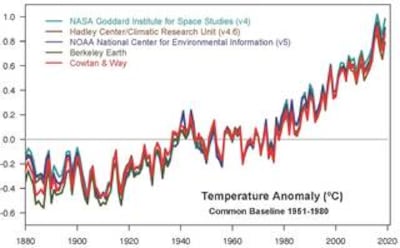SALT LAKE CITY — The Earth’s most recent rotation around the sun was the second warmest in 140 years of record keeping, with dire implications, according to a study by scientists from the National Oceanic and Atmospheric Administration and the National Aeronautics and Space Administration.
“Rising temperatures in the atmosphere and ocean are contributing to the continued mass loss from Greenland and Antarctica and to increases in some extreme events, such as heat waves, wildfires, intense precipitation,” according to NASA’s report, released yesterday.
Scientists at NASA’s Goddard Institute for Space Studies (GISS) found that 2019 was 1.8 degrees Fahrenheit above the the global average established from 1951 and 1980.
Separately and with a similar result, NOAA found that the 2019 global average temperature was 1.71 degrees Fahrenheit warmer than the average from the 20th century, as determined by scientists from the agency’s National Centers for Environmental Information (NCEI).
NOAA also reported that 2019 saw the second-smallest average covering of sea ice in the Arctic and Antarctic oceans of any year from 1979 to 2019.
The hottest year on record was 2016, which was just 0.07 Fahrenheit warmer than last year, according to the study.
The NOAA calculation was different than NASA’s because NOAA “used much of the same raw temperature data, but with a different interpolation into the Earth’s polar and other data-poor regions,” according to NASA.
NASA estimated with 95% certainty that its findings are accurate to within 0.1 degrees Fahrenheit. The agency used more than 20,000 surface measurements from points on the land, sea and the Antarctic.
Nine of the 10 warmest years on record have come within the last 15 years, the study found. This correlates to the nearly century and a half long trend of steadily rising temperatures.
“Every decade since the 1960s clearly has been warmer than the one before” said Gavin Schmidt, the director of GISS.

The average temperatures of the last few decades have increased faster than earlier decades, according to a study of temperature anomalies from 1880 to 2019 — with a baseline from 1951 to 1980 — conducted by five different organizations.
The NCEI’s chief of climate monitoring, Deke Arndt, didn’t expect the trend to change during the next 10 years.
“I would say, notwithstanding some sort of major, major geophysical event, it would be almost certain that the [coming] decade will be warmer than the previous,” Arndt said, as reported by NPR on Wednesday.


